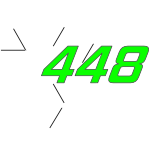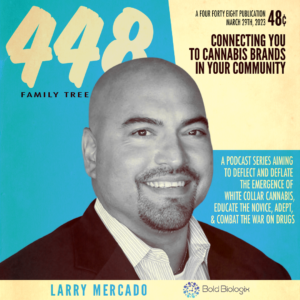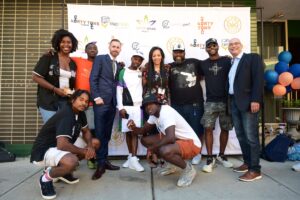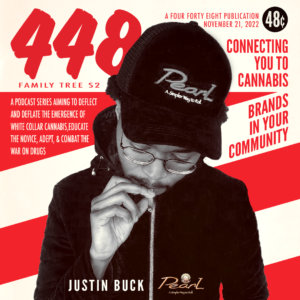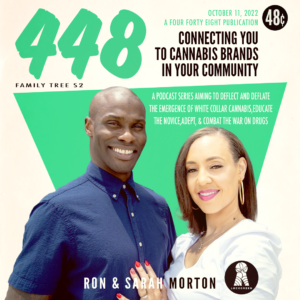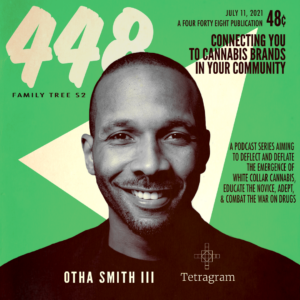Family Tree – Be Jubie: Interview with Jen Jackson
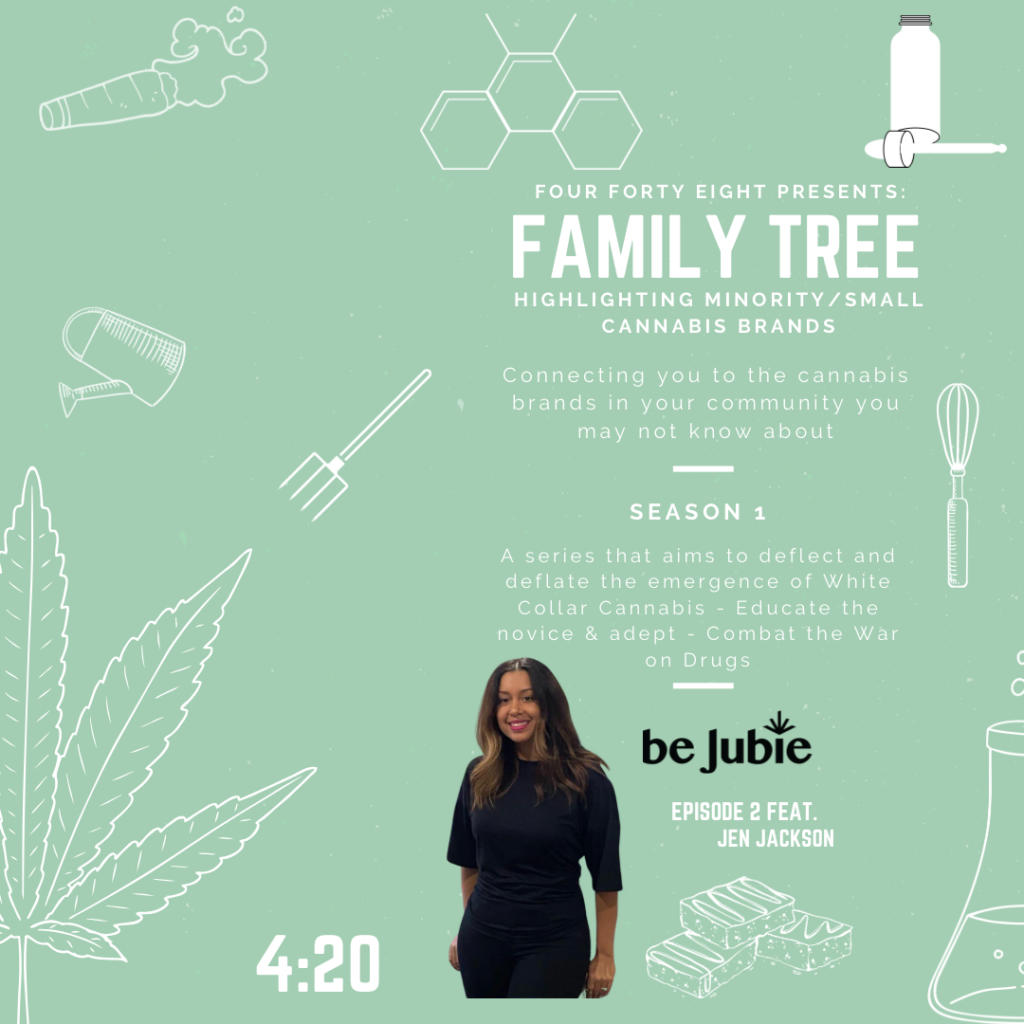

Jubilant- /ˈjo͞obələnt/ adj. feeling or expressing great happiness and triumph. Overjoyed, triumphant, rejoiceful, exuberant, are all feelings people have expressed when experiencing the effects of cannabis. Maryland based company, Be Jubie exudes just that. From a household phrase to the name of this up and coming CBD/cannabis startup. Be Jubie is on a mission to ‘Normalize’ the use and consumption of cannabis. PoC continue to bear the burden of the industry and continually makes grave sacrifices just to feel normal on a day to day basis. Founder Jen Jackson is no stranger to sacrifices herself. After a very successful corporate career she decided to take on building this budding empire full time after experiencing the pitfalls of corporate America first hand. Not only taking on entrepreneurship full time, but tackling the underlying social justice issues this industry continues to tiptoe around. As PoC sit in cages serving life sentences, their counterparts are on the opposite end of the spectrum making millions behind desks. Jen continually urges PoC to enter into the industry legally to change that narrative and start building generational wealth. This is not just another CBD company. This is CBD with a purpose.
“When I went through the competitive analysis to look at the industry and figure out what our niche could be or even products on the market. It was very clear that the brands that did exist, were geared towards white people, and mostly owned by white folks. I felt like there was a whole market that was being ignored.”
Q: What was your background before cannabis? How do you think that can be applied to the industry?
A: When I went through the competitive analysis to look at the industry and figure out what our niche could be or even products on the market. It was very clear that the brands that did exist, were geared towards white people, and mostly owned by white folks. I felt like there was a whole market that was being ignored. We all know that we suffer from anxiety, depression, and arthritis like everyone else. So I was really inspired to be the catalyst for my family and friends in my community to let people know that CBD is an all natural alternative that we can use. My background is actually in IT. I used to manage a software development team. I really enjoyed my job and career, it was stable. I had a 401K and 6-figure income. Everything was great. I always had an interest in getting into the industry. I didn’t really know how to go about it and my first thought, like most other people was having a dispensary. I didn’t have hundreds and thousands of dollars to invest and knew it wasn’t feasible.
In 2018 my mother put me on to CBD. She was mentioning wanting a CBD salve for her back pain during a visit. I learned that you didn’t need a cannabis card for that. I didn’t know anything about CBD and started doing months and months of research. I really fell in love with understanding the therapeutic benefits and the science behind cannabis. All these years I have been smoking but I didn’t really know what it was doing and how it worked with my body. I didn’t know that my body was biologically meant to consume cannabis. Learning all that, I was mind blown. Once I realized that CBD was more feasible for me to get into the industry, I realized that this was what I’m going to be doing. So I spoke with my husband, we had a lot of conversations about what that would look like, and transitioning from my IT career to CBD. I left my job about a year ago in June and launched in October and that’s how I got here.
I think there’s a direct alignment from my previous life to now. I used to manage products and I was responsible for delivering valuable software development every two weeks. In this kind of environment you have to focus on what value you’re bringing to the table and what you’re solving. So what do we need the most to bring value to our customers. that doesn’t require us to have to develop for years upon years before we make it to the market? The goal is to get to the market as soon as you can, learn, and iterate. With Be Jubie I am bootstrapping this on my own so I know I could not start with a lot of products and I also know that it’s not necessary to do that. You can start with one product, learn and grow from there.
Q: When you started the research process on CBD what were some of the early questions you wanted to answer?
A: I didn’t know anything so it was literally typing in google My first question was CBD what is it? You’ll find out that there is a lot of trash out there and I think it’s because we’re still learning about CBD so you’ll have the publications that are ill-informed. But when you start seeing more consistent responses you will be able to decide what’s real and what isn’t. But I used to listen to the CBD school podcast a lot on my commutes to work, they interview start ups and national brands which gave me tremendous insight into just running a business understanding the pitfalls what products people are using. They interviewed doctors who were using cannabinoid therapy as an alternative to opioids. It was just a great mix. CBD school was very helpful for me. During the higher-stakes conference I mentioned project CBD.org that’s literally like a CBD library I still reference them they’re very big on research they are very reputable and you can familiarize yourself with all the information they have. They do a great job of breaking down what is CBD, do you know how it works, etc. They have a lot of articles like you can look up how does CBD help with arthritis. I follow them on IG as well, they have a ton of information and their posts are basically articles.
“A lot of my customers are first-time CBD customers. I do have some customers that have used CBD in the past and the first thing they say is “this tastes so much better than anything I have ever used” CBD wise. The market is filled with fraudulent products since this industry is not regulated.”
Q: Have you tried any of the CBD brands we are more commonly used to seeing in stores?
A: Yeah. I ordered from brands that I thought aesthetically looked nice to see what’s the experience when I order from them. What is the packaging like? The tincture itself, what does it taste like? Sometimes there’s a nasty CBD out there that can be very earthy and it’s not great. So for my market research I definitely did that. So I wanted to see how I could differentiate myself and my products. With my products I definitely want to make the taste stand out! A lot of my customers are first-time CBD customers. I do have some customers that have used CBD in the past and the first thing they say is “this tastes so much better than anything I have ever used” CBD wise. The market is filled with fraudulent products since this industry is not regulated.
There’s a study that about 70% of labels are incorrect because there’s no regulation, effectiveness varies. Showing certificates of analysis (CoA’s) is a good way to know what you’re getting in the product. Be careful if you buy from amazon, the mall, or gas stations as most of the products there are fake, for example you cannot get 5000mg CBD products for ten dollars. A lot of those products don’t have a website of information to fall back on with a quality review of products. So for me taste, effectiveness, and quality are major.
Q: Do you find it hard to engage someone about the education of CBD Vs. THC (the running stereotype is that it’s going to get you “high” and some people in the 40s and up demographic don’t want to hear the facts)
A: Something I realized during my competitive analysis with the CBD market is that CBD brands make it a point to differentiate themselves from the THC as if it’s a bad thing. So some brands are like “CBD it doesn’t get you high come over to the good side”. I think it does a disservice to the plant. I do both sometimes and I find benefits in both THC and CBD. One of the things that I really wanted to do with Be Jubie is to really inform people that the cannabis plant as a whole is great. There are proven therapeutic benefits with THC and CBD and they can both be used together or separately. It’s not a one size fits all situation and we should embrace the plant.
We’re still learning, there are also other cannabinoids that are being researched that have benefits as well so let’s not demonize THC. They are both natural compounds of the plant and because of the arbitrary .3% people even differentiate Hemp from cannabis as well. My only logical explanation for that percentage is that possibly felt effects when it’s over .3%. This is why Words matter, it’s been literally ingrained in us that it’s a bad thing. We have to be careful with how we speak about it.
Q: What was your first experience with cannabis? What drew you to the plant?
A: I have been a consumer for about 20 years now. My parents always had an open dialogue with me, and I learned early that cannabis is just a plant. The first time I tried it I was 16, I didn’t know how to inhale and I don’t remember being high. When I went to college, that’s when I really started to use cannabis. I remember consuming it so much and then wanting to consume it on my own, because normally I usually do it in social settings, that I thought I was becoming addicted. Addiction runs in my family so I was always nervous that I could get addicted and when it transitioned from social settings to “damn I want to smoke” I quit for six months because I didn’t have all the knowledge that I have now. You do not get a physical addiction to cannabis, but you can adopt a physiological habit.
Q: Have you ever tried to or do you currently grow for yourself?
A: Oh lord heck no! I would love to try it though. Right now with having kids, having to be a teacher for them with the pandemic, and running this business I do not have the time to do it yet. I have one plant in my house and I’m learning to take care of that first. If I can get through raising this plant, we’ll see!
Q: Are you familiar with the M.O.R.E. Act? Since the bill was declined, do you feel there is an ambiguity of the social balance? How do we come together as a people and create a strong hold in the industry to where we can start being self sufficient.
A: I think we need to continue to share information like we did in the virtual cannabis event we did yesterday. I think that we need to network and work together like we’re doing right now. It’s interesting because now I’m starting to see more black CBD brands and I get excited when I see that. But then there’s also people that try to take my customers and I think that we can work together instead. I have zoom meetings set up with people where I’ll be talking with them about building their brand. There’s enough space for all of us to thrive. We don’t have to dig on each other to get to the top. We can all help each other and network to get to the top! As Black people you know, I feel like we don’t have a lot of trust and there are reasons for that.
Aligning yourself with people that are in the industry and are supportive of black excellence in the cannabis industry; we have to continue to spread that. We have to be a resource to each other if we can be and have the capacity to do so. Especially with what’s going on right now you cannot be scared to say that you support the Black Lives Matter initiative. I think all of that is important and letting your community know where your brand stands. We have to work together, because they will not let us in so we have to figure out how to pave the way for ourselves.
Q: What will it take for cannabis to be more prescribed to treat people vs current pharmaceutical methods?
A: This is something I’m a big advocate of. I have friends that are doctors and nurses and one asked how they can get involved in the industry. Being a healthcare worker and being well-versed on the subject matter of cannabis, as well as going to other doctors and talking to them about this, or just having training and courses for or things like that, as well becoming an expert on the subject matter as a healthcare professional is what we need so bad. Doctors are not going to be inclined to invest in cannabis related development systems if they don’t know what it is and the benefits of cannabis. We need to find a way to get that communicated to them and I would like to think that Doctors respect other doctors and maybe getting a doctor on board to get this message out will be able to help advance this idea in the future.
Q: What was it that got you over the mental hump and gave you that leverage to pursue Be Jubie full time? And what would you say to people that have a dream but are hesitant to pursue it?
A: It may sound corny but it is a passion! I also have to acknowledge that the company I was working for gave me so many opportunities it started to go into a different direction, and I started to lose passion. So I knew I needed to look for something new and I didn’t know if it was just finding another job with another company. I had some resources saved and after speaking with my husband we decided that I would put full force into Be Jubie and see where it goes. If it didn’t thrive after a period of time I told myself I’d just get another job. I’m starting the second half of my life and I feel like when you get to a certain age you start to evaluate where you are. I could’ve kept the life that I had just like that and been OK. But I felt like I was ready for a challenge. I wanted to take myself out of my comfort zone. Something really resonated with me and someone said that I was not raised to be an entrepreneur but I was raised to be an employee. You go to college and get a job and that’s just what you do.
I’ve even said a lot of times I respect the grind and hustle that entrepreneurs have but I will always be here for the 401(k). It wasn’t until I had this deep passion that I was like let me just try and see. When I tell you the personal growth that I have experienced just from these last seven months supersedes the years of growing in the company. Like even speaking in the event that I spoke in yesterday I was terrified. I’m terrified to watch the playback but that was me getting out of my comfort zone and growing as a person so I just want to keep going and see where this goes. I’m learning to live with being okay with failing and knowing that I will have regrets if there are things that I want to try but never have.
Thanks for reading! You can find premium broad spectrum CBD oil at Be Jubie’s site. Also, please be sure to check out our previous interview in the Family Tree series with Jasmine Toran here. Stay tuned for more interviews that can only be found at FourFortyEight.
